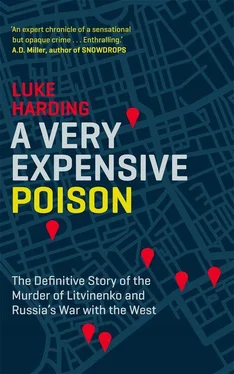* * *
Litvinenko was a punctilious officer, and over the coming months noted down the threats made against him. There were many. His phone was bugged; he noticed he was being followed. A well-known journalist with links to the security services, Alexander Khinstein, published Litvinenko’s identity. Another article accused him of torture, extortion and muggings.
One day in May when he came into work, Lieutenant Colonel N. V. Yenin bawled him out in front of his colleagues. Yenin threatened to assault him, and said: ‘You bastard, you traitor. You prevented honest Russian people from murdering this filthy Jew … If you don’t shut your trap we’ll sort you out in our own way.’
Days later, Litvinenko was returning with his wife Marina from their dacha to their Moscow flat. A gang of young people attacked and beat him, kicking him in the face. Litvinenko got his gun out, said he was an FSB officer, and fired a warning shot in the air. He tried to arrest the youths. One of them told him: ‘We know where you live. If you force us to go to the police we’ll cut your wife’s and your children’s heads off.’
Khokholkov and his allies were determined to make Litvinenko suffer. In August he was suspended from his department and told to find another internal job. The FSB’s human resources office made it clear that he had ‘betrayed the system’ by ‘washing dirty linen in public’. There were further libels in the newspapers, including a claim that he’d failed to pay child support to his ex-wife Natalia.
Faced with a scandal, Nikolai Kovalyov, the FSB’s director, had tried to get Litvinenko to drop his complaint. This didn’t work. Berezovsky, meanwhile, was pulling all the strings he could at the Kremlin. Prosecutors began an investigation. After a few weeks URPO was dissolved; Khokholkov transferred; Kovalyov fired. It looked like victory for Berezovsky and Litvinenko.
President Yeltsin then appointed an unknown mid-ranking officer to replace Kovalyov as head of the FSB. This was Vladimir Putin.
* * *
Berezovsky had many flaws, but the greatest of them was surely his inability to distinguish friend from foe. He had known Putin since late 1991. He regarded him as a protégé. They’d been on holiday in France. ‘He was my friend,’ Berezovsky would tell Scotland Yard. At the time, Berezovsky viewed Putin as someone who would loyally serve his interests.
Berezovsky encouraged the suspended Litvinenko to go and see this new director, to introduce himself and to tell him everything he knew.
In his memoir, The Uzbek File , Litvinenko writes: ‘Putin’s appointment was a shock to everyone. Unlike Kovalyov, who rose through the ranks to a three-star general, Putin was a little-known colonel of the reserves working for the Kremlin administration. Everyone considered him a Berezovsky puppet. The consensus among the operativniks was that the new Director will not last long. He will be rejected by the system.’
Litvinenko continued:
One day Berezovsky called me.
‘Alexander, could you go to Putin and tell him everything you have told me? And everything that you have not. He is a new man, you know, and would benefit from an insider’s view.’
I was surprised. The Director of the FSB could surely find me if he wanted to see me. Nevertheless I called at his office.
‘Litvinenko?’ asked his secretary. ‘We have been looking for you. They tell us there is no such officer.’
That was it, I thought, the system resists a newcomer.
‘I am on suspension,’ I said.
‘Come tomorrow morning. The Director will see you.’
Litvinenko spent that night ‘drawing up a scheme for Putin’. It contained everything he knew about organised crime and corruption, including the principal mob groups with their areas of activity. He drew arrows leading to their connections in government, with the FSB, the interior ministry and the tax service. He listed commercial companies used for money laundering. He included his Uzbek file, setting out the drugs trail from Afghanistan to Europe and America, the branches and contacts in Russia, and the ‘protection ring’ deep within the FSB.
The following morning, Litvinenko turned up with this impressive dossier. He brought along two colleagues, but Putin wanted to see him alone. Litvinenko recalled that he was unsure how to greet his new boss – should he address him as ‘Comrade Colonel’ or ‘Comrade Director’? He felt sorry for Putin. ‘We were of the same rank and I imagined myself in his shoes – a mid-level operativnik suddenly put in charge of some 100 senior generals with all their vested interests, connections and dirty secrets.’
In the end, Putin pre-empted Litvinenko, came up from his desk, and shook his hand. ‘He seemed even shorter than on TV,’ Litvinenko noticed.
It was to be their first and last substantial meeting. It was also unsuccessful. And rather surreal.
Litvinenko wrote:
From the first moment I felt he was not sincere. He avoided eye contact and behaved as if he was not the Director but an actor playing the Director’s role on stage. He looked at my schematic, made some face movements as if he was studying it for a couple of minutes. Asked a couple of questions – ‘What is this? What is that?’ – pointing at random points in the scheme.
But he obviously could not grasp the details in that short while. ‘Why is he doing this?’ I thought. ‘Is he trying to impress me ?’
‘Would you like to keep the scheme?’ I asked.
‘No, no, thank you. You keep it. It’s your work.’
Litvinenko handed Putin a list of FSB officers whom he regarded as ‘clean’, and remarked that there were still ‘honest people in the system’. He added that with Putin’s backing they could fight the corruption that was rife in Russia and the security services. Together they could ‘strike a blow’ against organised crime. Litvinenko told Putin: ‘If we decide to tackle the Russian mafia seriously it will be very dangerous.’
Putin nodded, feigning agreement. He took the list as well as the part of the dossier dealing with drugs. Putin wrote down Litvinenko’s home phone number. He said he’d be in touch. He never called.
It was months later that Litvinenko discovered what happened as soon as he shut the door and left the director’s office. Putin picked up the phone. He ordered the FSB’s internal affairs unit to begin an immediate criminal investigation against Litvinenko, and to bug Litvinenko’s telephone.
Putin’s indifferent attitude at their meeting bewildered Litvinenko: why would he not want to investigate criminal wrongdoing at the top of his own service? Later, Litvinenko said that his contacts inside the FSB gave an explanation. Putin, Litvinenko alleged, had connections with Khokholkov’s team from his time as deputy mayor for economic affairs in the St Petersburg administration of Anatoly Sobchak. Putin had ‘common money’ with Khokholkov and the Uzbeks. At the very least, Litvinenko wrote, Putin was personally involved in ‘a cover-up of organised criminal activities connected with drug traffic in Russia and Europe’.
The meeting with Putin lasted ten minutes. It took place in August 1998. From this moment on, Litvinenko’s already tricky situation got worse. His weapon was confiscated and salary stopped. His friend Berezovsky, however, seemed oblivious to the worsening relations. In November, Berezovsky wrote an open letter to Putin, which began: ‘Dear Vladimir Vladimirovich.’ The Kommersant newspaper owned by Berezovsky published it. Berezovsky’s tone was friendly – he still regarded Putin as an ally, and as an enemy of the communists, widely regarded as Yeltsin’s chief political foe.
Читать дальше












